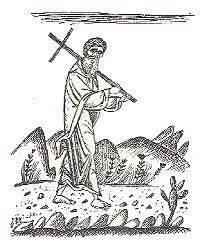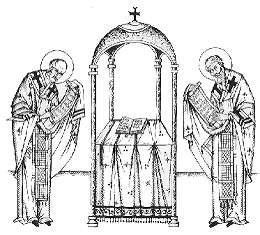Acquiring an Orthodox Mindset: Miscellaneous Articles

The Orthodox World-View, by Fr. Seraphim Rose
The Orthodox Mind, by Fr. John Whiteford.
Reconsidering the Meaning of Conversion: Fr. John Whiteford responds to a Christianity Today essay by Sam Torode.
How to Read the Bible, by Bishop Kallistos [Ware].
How to Read the Bible and Why, by Archimandrite Justin (Popovich) of Chelije
Revelation: The Seven Seals: Exerpts from a highly recommend series!
The Study of Holy Scripture, by Metr. Cyprian of Oropos and Fili.
A Eulogy to Fr. Georges Florovsky, by Archbishop Chrysostomos of Etna. Originally published in The Orthodox Word, 1980.
A Criticism of the Lack of Concern for Doctrine Among Russian Orthodox Believers: by Father Georges Florovsky. His remarks will hopefully inspire all those who are interested in the contents of this web site.
Contemporary Orthodox Theological Training: Orthodox Tradition, Vol. IV, No. 2.
Some Comments on Officialdom, the Sacred Canons, St. Nicodemos of the Holy Mountain, and the Continuity of Byzantine Thought, by Archbishop Chrysostomos.
The Concept of Tradition in the Fathers of the Church, by George S. Bebis (The Greek Orthodox Theological Review, Vol. XV, No. 1 [Spring 1970]).
The Unity of Scripture and Tradition: An Eastern Orthodox Contribution to the Prolegomena of Hermeneutics, by Nikos A. Nissiotis (The Greek Orthodox Theological Review, Vol. XI, No. 2 [Winter 1965-66]).
Theology in Present Day Greece, by Christos Yannaras (St. Vladimir's Seminary Quarterly, Vol. XVI, No. 4 [1972]).
An Excerpt from The Paschal Fire in Jerusalem, by Bishop Auxentios of Photiki. In these fourteen pages are found a very lucid and succinct treatment of some of the common misconceptions about Orthodoxy and Neo-Platonism, Icons, Palamite thought (including interaction with Fr. John Meyendorff's views), Western concepts of contemplation and meditation, etc. Start reading with the last paragraph of p. 125. The tables above this discussing the Holy Fire can be skipped.
The Humanist Quest for a Unity of Knowledge and the Orthodox Metaphysics of Light: A Corrective to Father John Meyendorff's Misunderstanding of the Theology of St. Gregory Palamas, by Bishop Auxentios of Photiki. Orthodox Tradition, Vol. XI, No. 3, pp. 7-17.
A Letter to Bishop Photii of Triaditza Concerning Frs. Alexander Schmemann and Alexander Men, by Archbishop Chrysostomos of Etna.
H.A. Wolfson's Philosophy of the Church Fathers, by Fr. John Romanides (The Greek Orthodox Theological Review, Vol. V, No. 1). The article is not available on line. Check a good local library.
Problems of Orthodoxy in America: The Canonical Problem, by Fr. Alexander Schmemann (St. Vladimir's Seminary Quarterly, vol. 8, no. 2 [1964]). This is an exceptional article—one of his best.

The Kingdom of God: "Progress" of the Cross?, by Archbishop Averky of Syracuse [of Blessed Memory]
"Imitate; Don't Innovate": Safeguarding the Integrity of the Orthodox Faith, by Archbishop Chrysostomos of Etna.
Forward to The Future Life According to Orthodox Teaching, by Dr. Constantine Cavarnos.
The First Ecumenical Synod and the Feast of Pascha: "...not with the Jews", by Archimandrite Sergius. He sheds new light on the curious penchant of some Orthodox (e.g., Archbishop Peter L'Huillier of the OCA) for attacking this element of our Traditional Paschal calculation. This new proposal for a common Paschal celebration is based on the Roman Catholic rendering of the Nicene formula, which, in turn, ignores the mandate not to celebrate with the Jews.
The Epistles of Metropolitan Philaret, on a number of important issues of our day.
The Julian Calendar: In Response to the Misapprehensions of Nicolas Ossorgin, by the Right Reverend Dr. Auxentios, Bishop of Photiki (Orthodox Tradition, XI, 1).
The Encyclical of the Eastern Patriarchs, 1848. A Reply to the Epistle of Pope Pius IX, "to the Easterns." See also the Encyclical of 1895.
BEM and Orthodox Spirituality, by Archbishop Chrysostomos of Etna.
Was St. John Chrysostom Anti-Semitic? Comments by an anonymous Orthodox scholar.
Genesis and Early Man: The Orthodox Patristic Understanding. Fr. Seraphim Roses Response to Dr. Kalomiros.
The Historical Study of Orthodox Theology: Some Basic Guidelines. Lecture 1 from Orthodox and Roman Catholic Relations From the Fourth Crusade to the Hesychastic Controversy. by Archbishop Chrysostomos.
Not a great deal can one expect from reliance on his personal philosophical reasoning for subjects not found in mundane life. It is more proper to follow divine revelation and the explications for such given by people who have prayed, labored, and purified their inner and outer lives more than we. In those whose souls are closer to heaven than our own, the image of God is more obvious and their insight clearer."
—Metropolitan Philaret of Moscow,
as quoted by Archbishop Chrysostomos in his article
"BEM and Orthodox Spirituality," Greek Orthodox
Theological Review, 1987 (Vol. 32, pp. 51-68).
Far worse, however, is the state of those who, being unrooted in the true sources of Holy Orthodoxy, occupy the positions of pastors and theologians and in their "learned ignorance" seek to guide their flocks according to some fashionable intellectual current of the day....
Such...are the "theologians" of the "Paris" and other modernist schools who, being at home in heterodox modes of thought and life, dare to present the Holy Fathers themselves according to the disfigured modern understanding of them, transmitting neither their true message nor (much less) their Orthodox savor, giving rather an academic two-dimensional caricature of them, suitable only for presentation in decadent ecumenical salons and in lifeless academic journals.
Both of these types of "Orthodox" people are precisely those who are cut off from the sources of Orthodoxy, and who in turn help to cut others off from these sources. The movement of true Orthodoxy in our own times has seen with increasing clarity the need to separate itself from this pseudo- or semi-Orthodoxy and refind its roots in the true and unadulterated sources of Orthodoxy, the Holy Fathers. And this is precisely what the Blessed Paisius saw and did, making him a key figure for us today.
—Fr. Seraphim Rose of Platina in his Introduction to Blessed Paisius Velichkovsky

